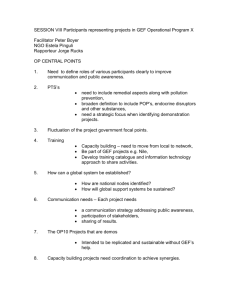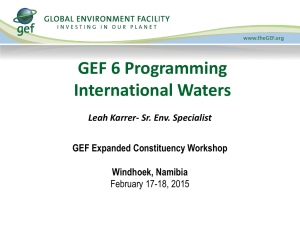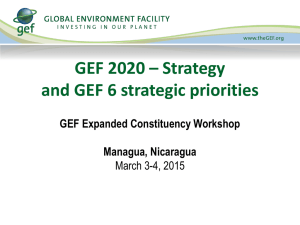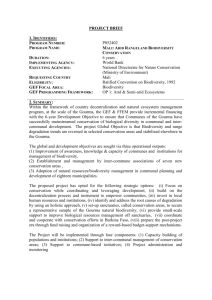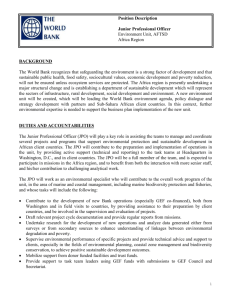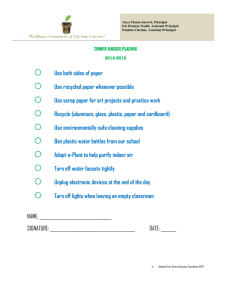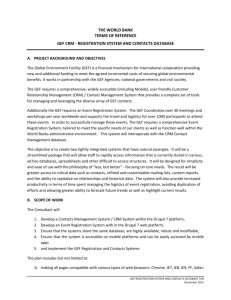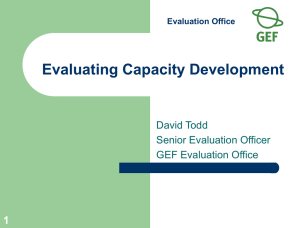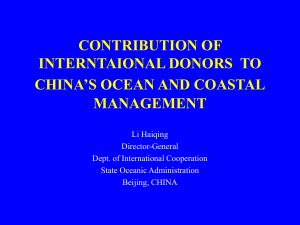Presentation of Funding Experiences and Perspectives
advertisement
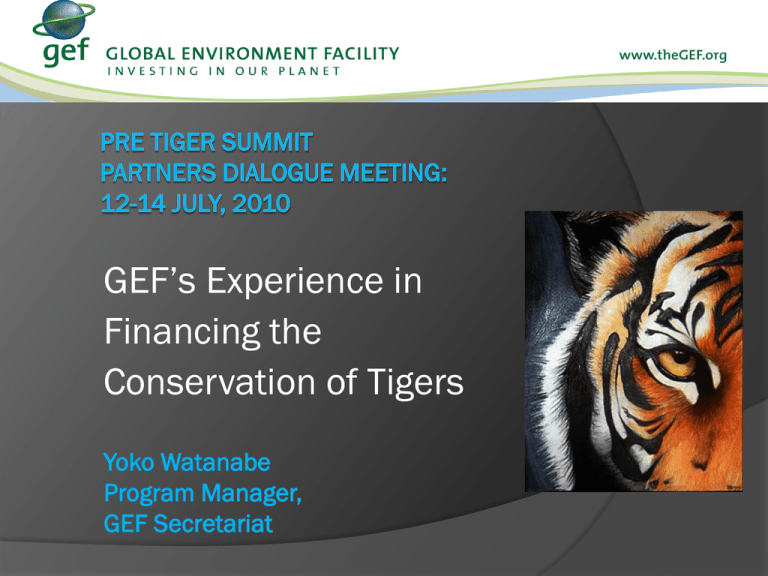
GEF’s Experience in Financing the Conservation of Tigers Yoko Watanabe Program Manager, GEF Secretariat Overview of the Presentation 1. 2. 3. 4. 5. Introduction GEF’s Partnership with the Global Tiger Initiative GEF’s Experience in Financing Tiger Conservation GEF’s Future Investment Strategy GEF’s Project Financing Modalities What is the GEF? A financial mechanism established to protect the global environment and promote sustainable development. GEF supports developing countries and economies in transition on incremental cost of actions to protect the global environment. Financial mechanism for the CBD, UNFCCC, UNCCD, and POPs. GEF’s Six Focal Areas: Biodiversity, Climate Change, Int’l Waters, Ozone depletion, Land degradation, and POPs. Biodiversity: GEF Investment and Achievements GEF Investment of $2.3 billion, with $5.4 billion cofinance, to support 790 projects in more than 155 countries to conserve and sustainably use of biodiversity Improved management of 2,302 protected areas, covering 634 million hectares, helped achieve global target of 10% of the world’s land under protection Enabling productive landscapes and seascapes to become biodiversity-friendly, covering over 160 million hectares Pioneer investor in testing and scaling-up of conservation trust funds and payments for ecosystem services Supported the development of National Biosafety Frameworks in 123 countries and their implementation GEF Partnership with the Global Tiger Initiative Founding and major partner of the GTI. Financing two Medium Size Projects through the World Bank, with total GEF grant of $1.5 million. To support work on: Organization of the Global Tiger Summit in Sept 2010. Development of financial architecture for tiger conservation. Strengthen regional capacity on wildlife trade. GEF Funding for Tiger Habitat GEF is arguably the largest funder on tiger and its habitats conservation. Total of 19 projects in all TRCs, implemented by the World Bank and UNDP, with total funding of $96.7 million The Critical Ecosystem Partnership Fund (CEPF), a partnership initiative of GEF, WB, CI and others, also provided several grants on tiger. GEF Project Example: Cambodia Virachey National Park Management Finance: GEF $2.75m, Cofinance $2.25m Basic Info: 2000, World Bank, Govt, 3325km2, largest PA Objective: Minimize illegal exploitation and degradation of biodiversity Outcomes: 1) Strengthened park mgmt, 2) Trained staff, 3) Livelihood options developed, etc. GEF Project Example: Nepal Landscape Conservation around Chitwan Finance: GEF $ 0.75m, Cofinance 0.9m Basic Info: 2001, UNDP, KMTNC/NTNC, Nepal’s key tiger habitat Objective: Manage Barandabhar corridor to conserve viable populations of flagship species (tiger and rhino) and their habitat. Outcomes: 1) strengthened mgmt of corridor forest and grassland; 2) developed community-based conservation model: income generation activities, etc. GEF Project Example: Russia PA Network in Khabarovsk Kray Finance: GEF $0.75m, Cofinance $1m Basic Info: 2001, WB, Wildlife Foundation, 4000km2, largest tiger PA (Sikhote-Alin) Objective: Establish integrated protected areas system. Outcomes: 1) Established new PA; 2) Strengthened PA network; 3) Increase public awareness, etc Future Financing: GEF-5 Biodiversity Program: Strategic Objectives Objectives 1. Improve Sustainability of Protected Area Systems 2. Mainstreaming Biodiversity in Production Landscapes/ Seascapes and Sectors 3. Build capacity to implement the Cartagena Protocol on Biosafety 4. Capacity Building on Access and Benefit Sharing GEF’s Grant Schemes FY2007-2010 Biodiversity: $1.2 billion Land Degradation: $400 million Sustainable Forest Management: $250 million Grant sizes: Full-size project (above $1 million) Medium-size project (below $1 million) Small Grants Program (max $50000) Grant modalities: Country level Projects (utilizing country STAR allocation) Programmatic Approach (Umbrella platform facility, along with country level sub-projects) Incentive scheme through the Sustainable Forest Management Program. GEF’s System of Transparent Allocation of Resources (STAR) Biodiversity Bangladesh ($1.88m) Bhutan ($1.96m) Cambodia ($3.85m) China ($52.67m) India ($30.58m) Indonesia ($54.17m) Lao PDR ($6.11m) Malaysia ($14.66m) Myanmar ($6.72m) Nepal ($2.67m) Russian Federation ($24.37m) Thailand ($9.05m) Vietnam ($12.12m) New Funding for the Tiger Despite close to $100 million invested by GEF, tiger populations continue to decline New initiative needs to look in to new and innovative approach learning lessons from the past. Target key habitats more strategically and in an integrated manner. High level commitment and engagements. GEF is looking forward to a productive partnership
